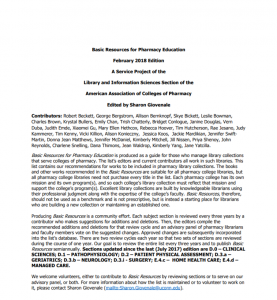What you will find here: The Therapeutics Initiative (TI) was established in 1994 by the Department of Pharmacology and Therapeutics in cooperation with the Department of Family Practice at The University of British Columbia with its mission to provide physicians and pharmacists with up-to-date, evidence-based, practical information on prescription drug therapy.
Category Archives: Additional Clinical Resources
Canadian Agency for Drugs & Technologies in Health: Resources
What you will find here: CADTH is an independent, not-for-profit organization responsible for providing health care decision-makers with objective evidence to help make informed decisions about the optimal use of health technologies, including: Drugs, Diagnostic tests, Medical, dental, and surgical devices and procedures.
Resources
CADTH provides a variety of resources that enable you to find, produce, interpret, and implement evidence. These include software applications, search tools, customized Excel spreadsheets, and more. If you have any questions about CADTH’s resources, please contact CADTH at our main office or get in touch with the CADTH Liaison Officer nearest to you.
Advanced Cardiovascular Life Support in Adults
What you will find here: UpToDate – Advanced Cardiovascular Life Support in Adults.
Go to https://www.uptodate.com/contents/advanced-cardiac-life-support-acls-in-adults
Advanced cardiac life support (ACLS) in adults – UpToDate
The field of resuscitation has been evolving for more than two centuries. The Paris Academy of Science recommended mouth-to-mouth ventilation for drowning victi
Advanced Cardiovascular Life Support (ACLS)
What you will find here: Adult advanced cardiovascular life support guidelines.
Part 7: Adult Advanced Cardiovascular Life Support
The review considered the use of Amiodarone, Lidocaine, Magnesium and Beta-blockers for antiarrhythmic therapy during and immediately after adult ventricular fibrillation (VF) and pulseless ventricular tachycardia (pVT) cardiac arrest. As a result, the Adult writing group’s recommendations for CPR and ECC have been updated and now provide further clarity regarding the application of antiarrhythmics during cardiac arrest.
British Columbia Guidelines
What you will find here: British Columbia Guidelines are clinical practice guidelines and protocols that provide recommendations to B.C. practitioners on delivering high quality, appropriate care to patients with specific clinical conditions or diseases.guide.
- Go to https://www2.gov.bc.ca/gov/content/health/practitioner-professional-resources/bc-guidelines
- Select the required resource or disease state from the side tool bar
BC Guidelines – Province of British Columbia
Clinical Practice Guidelines
Basic Resources for Pharmacy Education 2018 (Compilation)
What you will find here: Document outlining basic resources for pharmacy education topics.
Stopping Medications Safely
What you will find here: Medstopper is a tool to help clinicians and patients make decisions about reducing or stopping medications. By entering the list of medications a patient is receiving, Medstopper sequences the drugs from “more likely to stop” to “less likely to stop”, based on three key criteria: the potential of the drug to improve symptoms, its potential to reduce the risk of future illness and its likelihood of causing harm. Suggestions for how to taper the medication are also provided.
Medications in Pediatrics
What you will find here: BC Children’s and Women’s Hospital (C&W) Online Formulary. The drug monographs and practice recommendations contained in this reference reflect the current practices at C&W.

